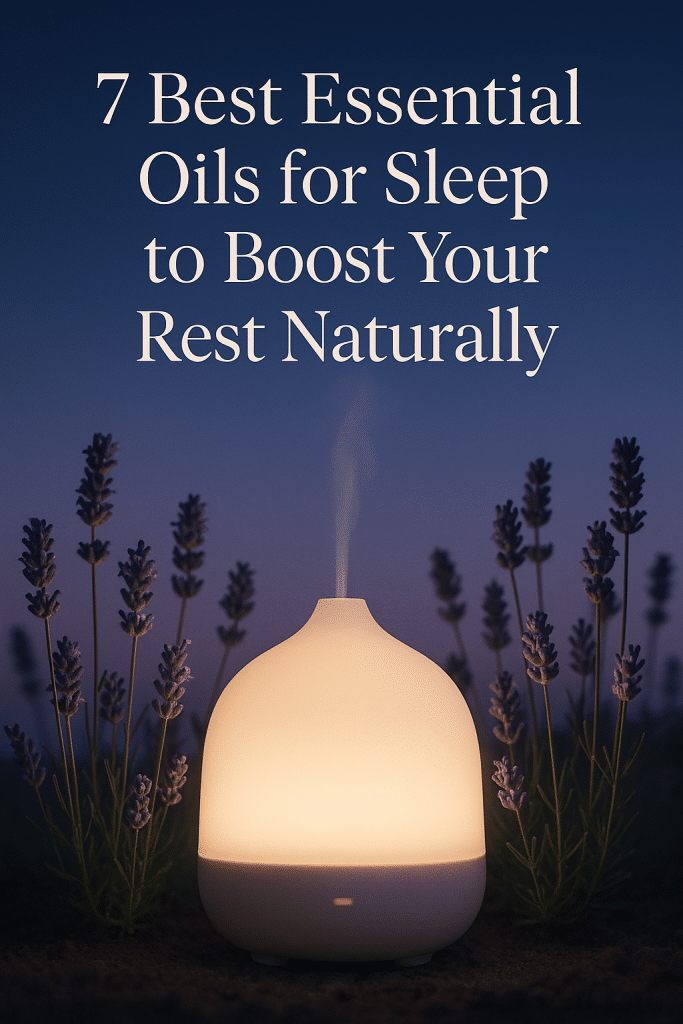Getting a good night’s sleep is no luxury—it’s an essential part of our health and well-being. But for many of us health-conscious adults, easing into deep, restorative rest can feel like chasing a fleeting dream. If you’ve been searching for natural remedies that genuinely offer relief without relying on harsh pharmaceutical sleep aids, you’re not alone. That’s why I’m excited to dive into a topic that’s very close to my heart: the best essential oils for sleep and how they can elevate your nightly routine.
In this comprehensive article, I’ll walk you through the science behind essential oils, help you navigate the crowded landscape of products, and introduce you to seven standout oils that have earned their reputation as sleep boosters. Whether you’re battling occasional sleeplessness, persistent insomnia, or just want to improve your relaxation ritual, you’ll find actionable insights here. Plus, I’ll share how to blend these oils safely, precautions to keep in mind, and the best ways to integrate aromatherapy into a holistic sleep hygiene routine. Ready to transform your nights? Let’s explore!
Understanding Sleep Challenges and the Need for Natural Solutions
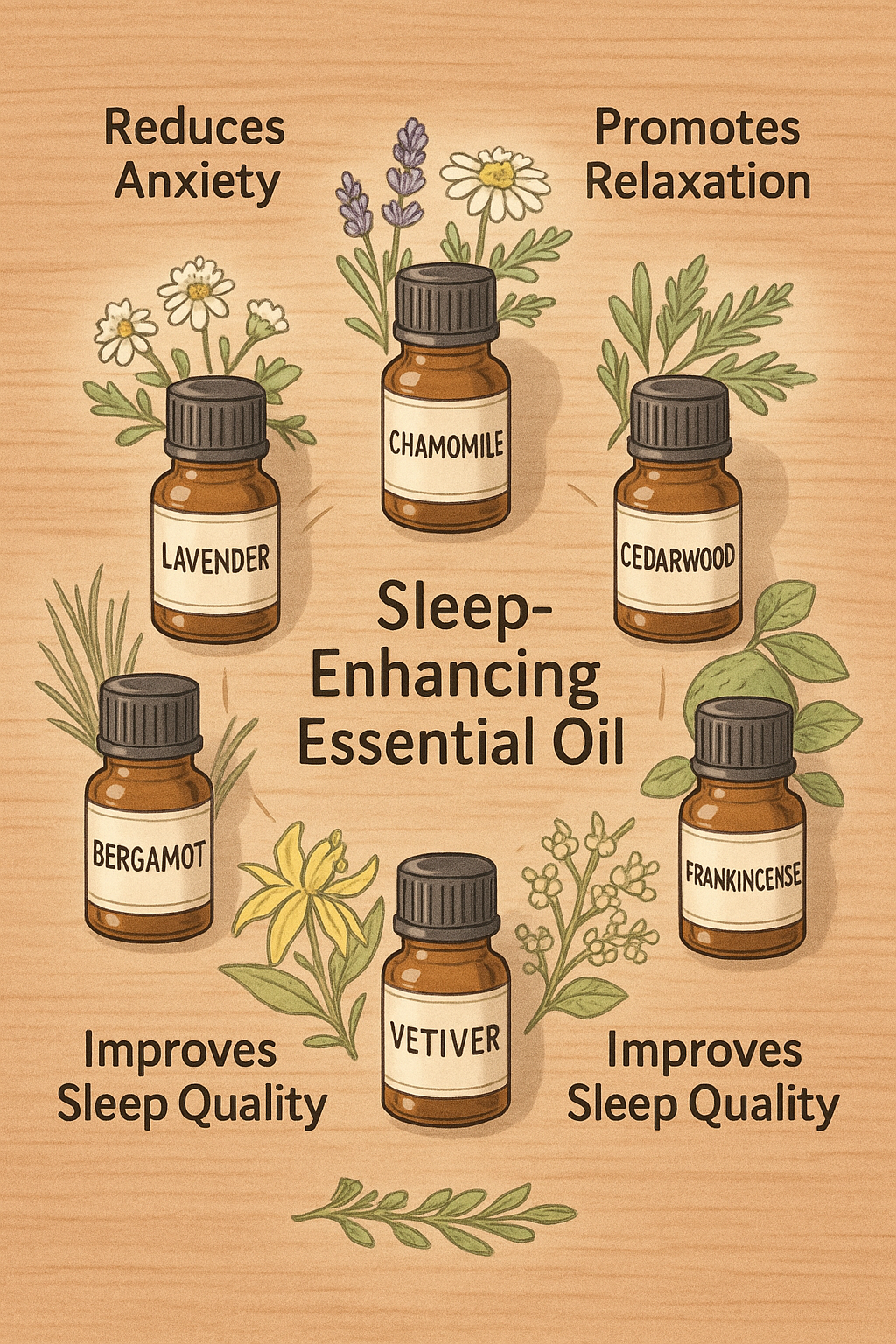
Common Causes of Insomnia and Poor Sleep Hygiene
If you’re struggling to catch quality Z’s, it helps to understand what might be disrupting your sleep pattern. Insomnia and restless nights can stem from a variety of causes:
- Stress and Anxiety: The most frequent culprits, stress and worry keep the mind racing at bedtime.
- Poor Sleep Habits: Erratic schedules, excessive screen time, and stimulating activities before bed degrade sleep quality.
- Physical Discomfort: From chronic pain to digestive issues and breathing problems like sleep apnea, physical health matters.
- Environmental Factors: Noise, temperature, and lighting in your bedroom all influence your ability to fall and stay asleep.
- Hormonal Changes: For women, menopause and pregnancy affect sleep patterns.
- Substance Use: Caffeine, alcohol, and even some medications disrupt natural sleep rhythms.
Many adults facing these issues attempt to self-medicate with over-the-counter pills or prescription drugs. While these medications can provide temporary relief, they often come with side effects like daytime drowsiness, dependency, or tolerance buildup. This reality fuels the growing demand for natural, holistic solutions that address sleep problems without compromising health.
Risks and Limitations of Conventional Sleep Aids
Prescription sleep medications, though effective for some, aren’t ideal for everyone. They may alter sleep architecture, causing less restorative REM or deep sleep. Long-term use can lead to dependence or tolerance, you might find yourself needing higher doses over time to get the same effect. Over-the-counter remedies containing antihistamines may cause dry mouth, dizziness, or memory issues.
Given these concerns, many health-conscious adults seek alternatives that promote genuine relaxation and nervous system balance naturally. Here’s where essential oils and aromatherapy come in—offering a plant-based, side-effect-free way to create calming sleep-supportive rituals.
How Essential Oils Influence Sleep and Relaxation
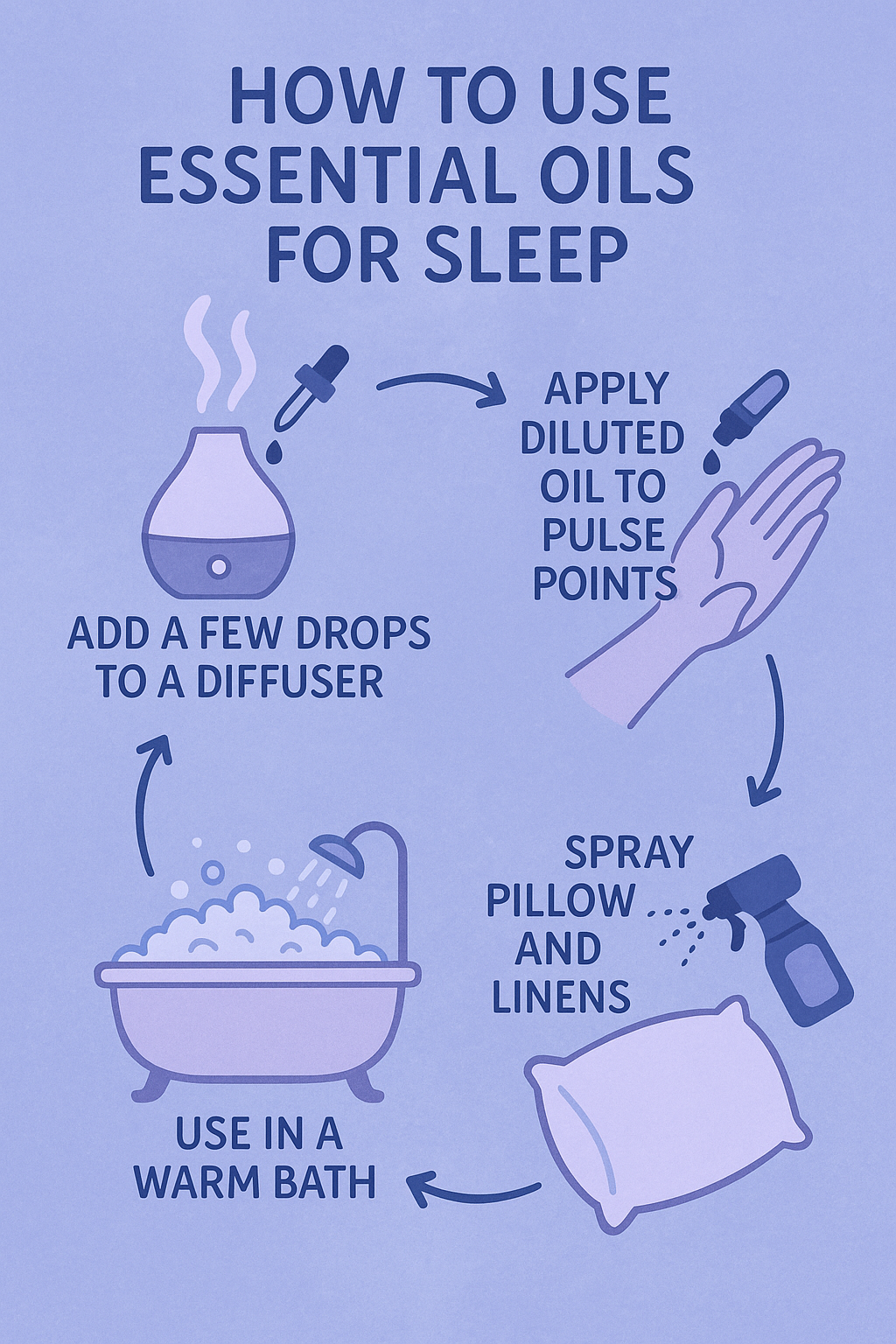
Aromatherapy and the Nervous System: A Scientific Perspective
Ever wonder why a particular scent can instantly soothe or uplift your mood? Essential oils influence our sleep by interacting with the nervous system, particularly the limbic region of the brain—the hub for emotions and memories.
When inhaled, volatile aromatic compounds from essential oils travel through olfactory receptors and send signals that modulate neurotransmitters like serotonin and dopamine. These brain chemicals regulate mood, anxiety, and sleep-wake cycles. Certain oils can activate the parasympathetic nervous system, often dubbed the “rest and digest” system, which lowers heart rate and cortisol levels, calming the body down for restful sleep.
Clinical studies support aromatherapy’s role in improving sleep onset latency (how quickly you fall asleep), reducing nighttime awakenings, and enhancing sleep quality. For instance:
- Lavender oil is one of the most studied essential oils, shown in randomized trials to decrease anxiety and improve deep sleep stages.
- Chamomile has sedative effects similar to mild anxiolytic drugs.
- Aromas like sandalwood and vetiver promote relaxation by reducing nervous system excitability.
This growing body of evidence underlines how essential oils aren’t just pleasant smells but potent natural sleep aids with biochemical effects.
Key Aromatic Compounds That Promote Sleep Onset and Quality
Certain chemical constituents in essential oils are known for their sedative and relaxing properties:
| Compound | Properties | Found In |
|——————–|——————————————–|——————————|
| Linalool | Calming, anxiolytic | Lavender, Bergamot |
| Linalyl acetate | Sedative, muscle relaxant | Lavender |
| Chamazulene | Anti-inflammatory, calming | Chamomile Blue |
| Valerenic acid | Nervous system calming | Valerian root extracts (not in essential oil) |
| Alpha-Cedrene | Sedative, anti-anxiety | Cedarwood |
| Santalol | Grounding, reduces stress | Sandalwood |
| Vetiverol | Balances nervous system, deep sedative | Vetiver |
Understanding these compounds helps clarify why specific oils are effective for sleep: they stimulate calming neurotransmitters, ease muscle tension, and reduce nervous system hyperactivity.
Criteria for Selecting the Best Essential Oils for Sleep
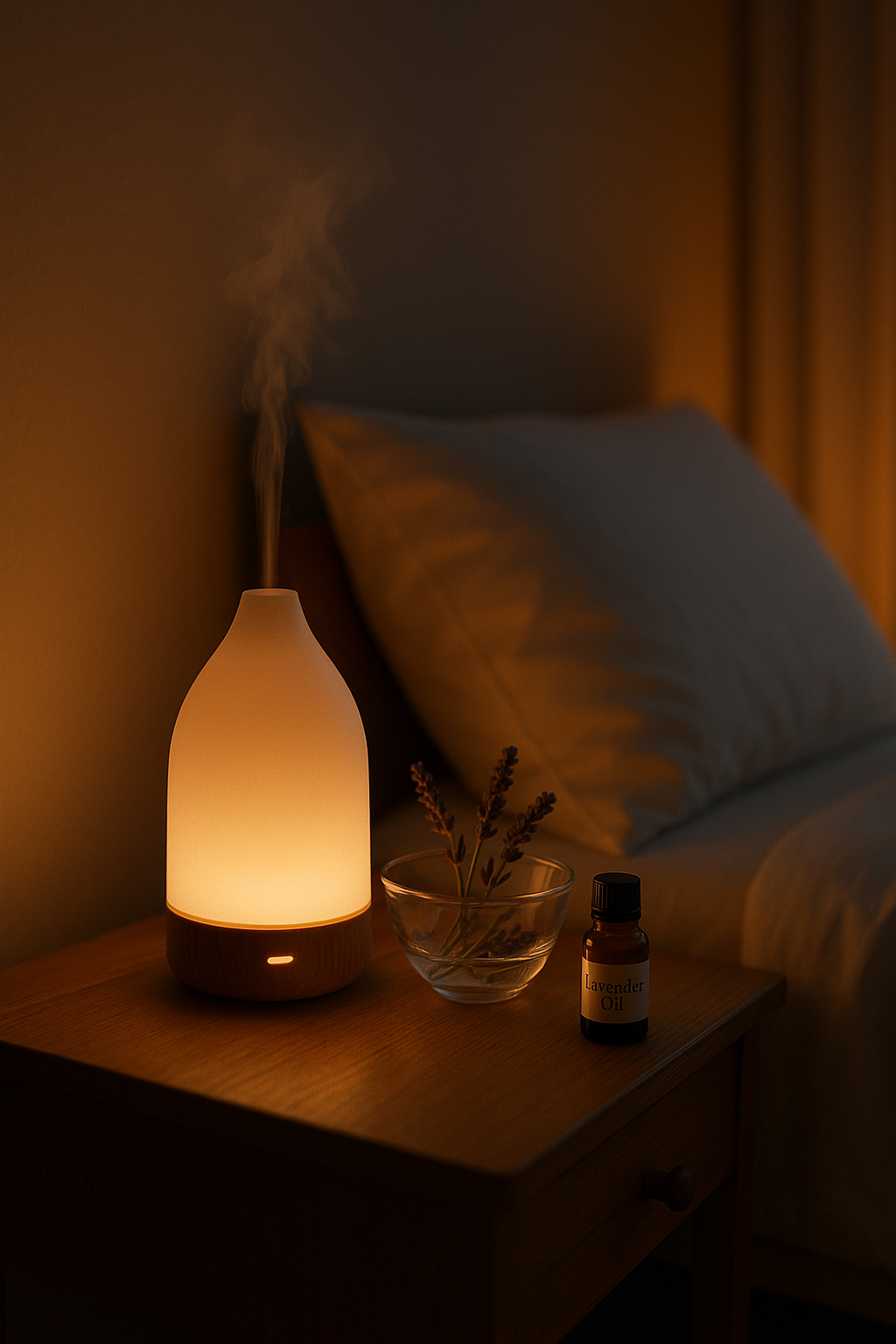
Safety Considerations for Different Populations
When choosing essential oils for sleep, especially with health in mind, safety is paramount:
- Pregnancy and Nursing: Avoid oils with strong uterotonic or stimulating effects (e.g., rosemary, clary sage) unless advised by a healthcare provider. Lavender, chamomile, and sandalwood are generally considered safe in moderation.
- Children: Use milder oils (like Roman chamomile) and dilute well. Some oils may irritate young skin.
- Sensitive Skin: Always dilute essential oils in carrier oils like jojoba or almond oil before applying topically.
- Allergies: Conduct a patch test before regular use to rule out sensitivities.
- Medical Conditions and Medication: Consult your physician if you have chronic illnesses or take medications to avoid adverse interactions.
Purity, Sourcing, and Quality Markers in Essential Oils
High-quality essential oils deliver the best therapeutic results. Here are markers to consider:
- 100% Pure and Natural: Avoid synthetic oils or blends with fillers.
- Chemotype Labeled: Oils like lavender can have different chemical profiles; look for chemotype details for consistency.
- Certified Organic or Wildcrafted: These guarantee free-from pesticides and chemical treatments.
- Steam Distilled or Cold Pressed: Preferred extraction methods that preserve therapeutic constituents.
- Reputable Brands: Choose brands that provide batch-specific GC/MS test reports verifying purity and quality.
Now, let’s take a close look at seven essential oils standing out as the best essential oils for sleep.
The 7 Best Essential Oils for Sleep and Their Unique Benefits
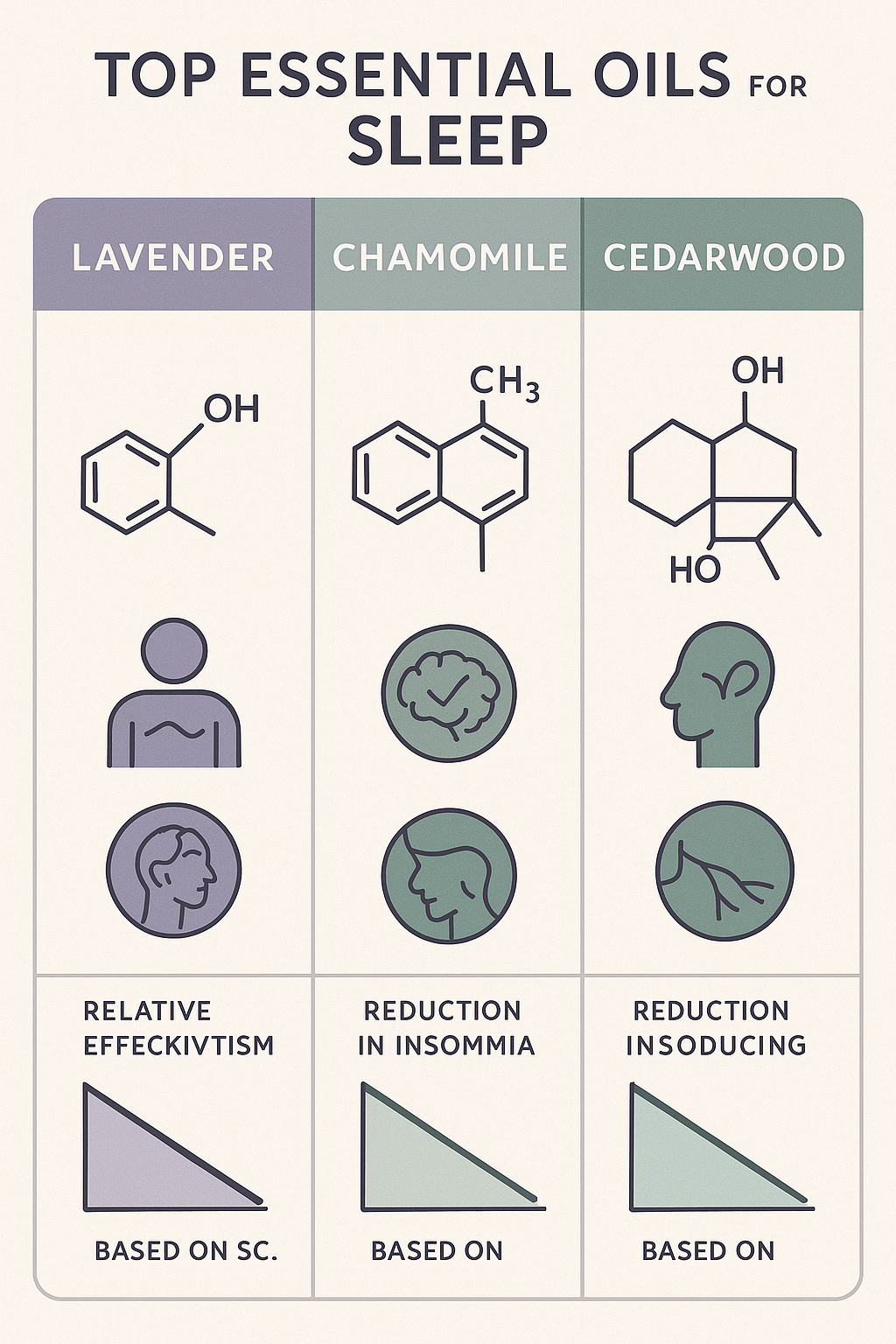
doTERRA Lavender Essential Oil: Calming and Versatile Relaxation
Benefits and Usage Tips
Lavender is the gold standard for sleep aromatherapy. doTERRA’s Lavender Essential Oil, carefully sourced and tested, offers a soothing, floral aroma with powerful relaxation properties. It helps reduce anxiety, ease muscle tension, and supports restful sleep stages.
- How to use: Diffuse 3-4 drops in your bedroom before sleep or add a few drops to your pillow.
- Topical: Dilute with carrier oil and massage onto feet, neck, or temples.
- Internal: For adults, dilute 1 drop in 4 oz. of water for calmness (consult a doctor before ingestion).
- Additional uses: Mist linens or add in baths for broader calming effects.
Price and Availability: A 15 mL bottle retails at approximately $38.67 with wholesale options at $29.00. Available at doterra.com.
Lavender is ideal for anyone wanting a well-established, multipurpose sleep aid that doubles as a stress reliever.
Plant Therapy Jasmine Absolute Essential Oil: Floral Serenity and Mood Support
Aromatherapeutic Effects and Sleep Enhancement
Jasmine Absolute is known for its rich, sweet, and heady floral scent, promoting a serene mood that reduces nervous tension. While not a classic sedative, it complements sleep routines by uplifting the mood and combatting stress-related insomnia.
- Use: Diffuse a few drops in the evening to create a positive, calming atmosphere.
- Topical: Use sparingly; mix with carrier oils due to its potent nature.
- Sizes/Price: Available in 2.5 mL ($49.99) up to 10 mL ($129.99) at planttherapy.com.
Jasmine suits those who find anxiety or mood swings contribute to sleeplessness, pairing well with more sedative oils like lavender.
Neal’s Yard Remedies Chamomile Roman Essential Oil: Gentle Anxiety Relief
Ideal Application Methods for Restful Sleep
Roman Chamomile is a mild, fruity-scented oil that balances emotions and calms the nervous system without overpowering. It’s gentle enough for children over two and those with sensitive skin.
- Relaxing bath: Add up to 5 drops into 2 tablespoons of bath/shower oil.
- Inhalation: Inhale steam with 4–6 drops to soothe respiratory comfort and anxious mind.
- Massage: Dilute into a carrier oil to ease muscle tension and induce calm.
Pricing: Available at Neal’s Yard Remedies online and other retailers matching quality standards.
Chamomile is perfect for those sensitive to stronger oils who desire consistent calming and anti-anxiety benefits.
Sandalwood Essentials Sandalwood Essential Oil: Grounding and Mindful Calm
Top Product Picks and Usage Recommendations
Sandalwood’s warm, woodsy aroma creates a grounding effect, reducing mental chatter and inducing deeper states of relaxation.
Top recommended products include:
- The Essential Oil Company – Sandalwood EI: Steam distilled from Santalum album, known for its rich scent.
- Neal’s Yard Remedies Sandalwood: Certified organic, sustainably sourced.
-
Calli Essentials Sandalwood: Ethically harvested from India with anti-inflammatory properties.
-
Use recommendations: Diffuse in your bedroom, add to a warm bath, or dilute for relaxing massages.
- Precautions: Always dilute before topical use; test sensitivity first.
Sandalwood is ideal for meditators, those with overactive minds, or anyone needing a calming anchor before sleep.
Edens Garden Vetiver Essential Oil: Earthy Aroma for Deep Sleep
Combining Vetiver with Other Oils for Enhanced Effects
Vetiver is famous for its smoky, woody scent and deeply calming qualities that promote long-lasting sedation and nervous system balance. It’s a frequently recommended oil for deep, restorative sleep.
- Use: Add to diffuser 30 minutes before bed or apply diluted to pulse points.
- Blends well with: Sandalwood, Cedarwood, Frankincense, and Lavender to create restful combinations.
Price: Available affordably on Edens Garden’s website, assuring quality and purity.
Vetiver suits deep sleepers and those with chronic hyperarousal or post-stress sleep disruptions.
Rocky Mountain Oils Cedarwood Essential Oil: Soothing and Respiratory Support
Integrating Cedarwood into a Pre-Sleep Routine
Cedarwood offers a soft, woody scent that not only helps you relax mentally but also supports easier breathing—a boon for those with mild asthma or congestion.
- Diffusion: Use 3-5 drops in the bedroom diffuser.
- Topical: Dilute with carrier oil and apply to chest or neck.
- Bath: Blend into bathwater for dual physical and mental soothing.
Safety precautions: Avoid undiluted topical use. Pregnant women should consult their doctors first.
Where to Buy: Rocky Mountain Oils (rockymountainsoap.com) provides top-tier cedarwood oils.
Cedarwood is especially helpful for people who notice breathing difficulties or tension at bedtime impact their sleep.
NOW Foods Valerian Root Supplements: Natural Sedation Beyond Essential Oils
While valerian root cannot be distilled into an essential oil, it remains one of the most potent herbal sleep remedies.
- Form: Available as capsules and extracts by NOW Foods (nowfoods.com).
- Benefits: Traditional herb used to relieve anxiety, nervous tension, and improve sleep onset.
- Use: Taken orally according to package directions; best combined with essential oil aromatherapy for a balanced natural sleep protocol.
For health-conscious adults seeking an all-encompassing natural approach, valerian root supplements can be an excellent companion to essential oils.
Crafting Personalized Essential Oil Blends for Sleep and Stress Relief
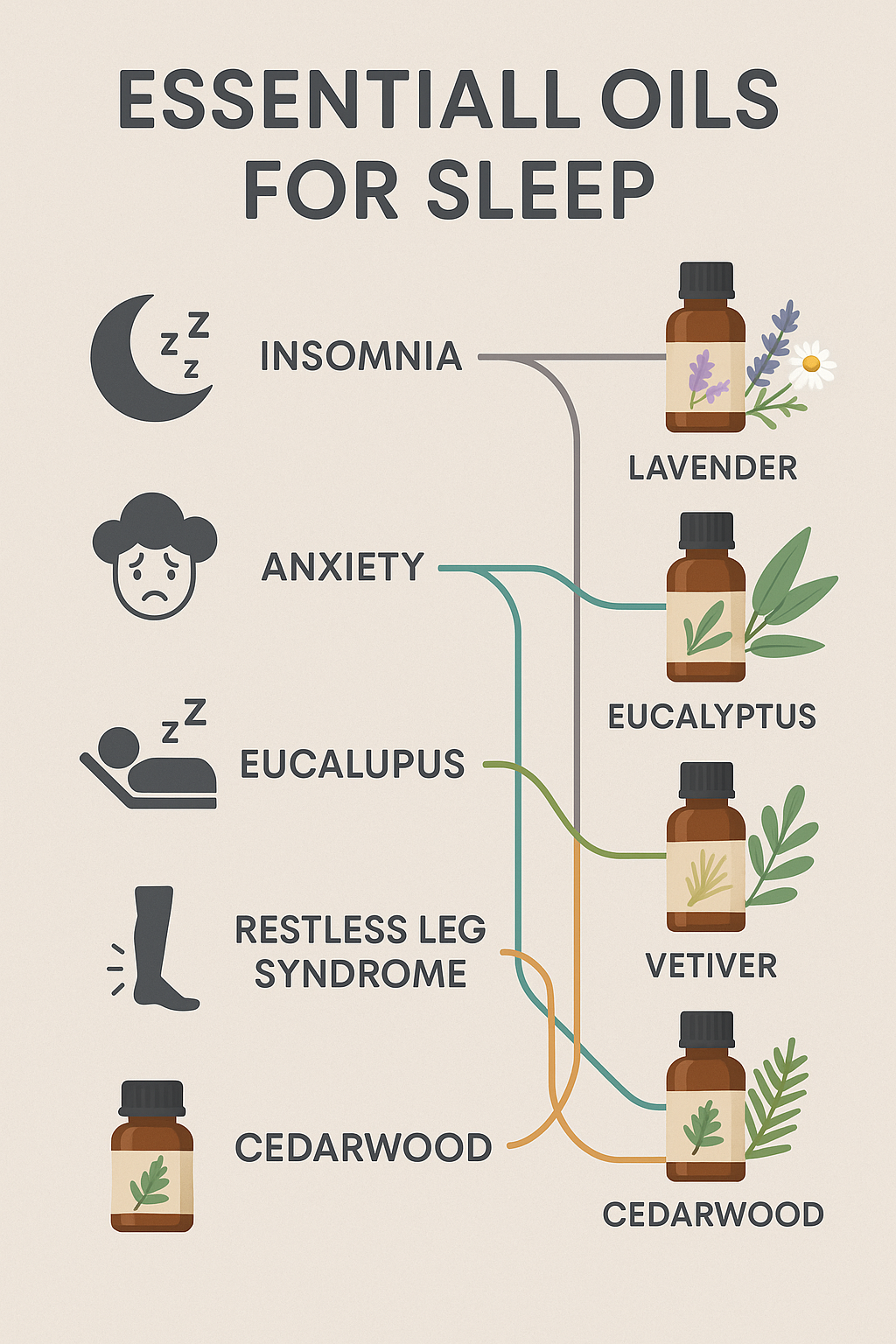
Best Diffuser Blends to Reduce Sleep Latency and Induce Relaxation
Here are tried-and-tested diffuser blends to help calm your mind and ease you gently into sleep:
| Blend Name | Ingredients | Ratio | Notes |
|———————|———————————————–|————————|—————————————-|
| Classic Sleep Blend | Lavender (5 drops), Vetiver (3 drops), Cedarwood (2 drops) | Total: 10 drops | Balanced floral and woody sedative blend |
| Floral Serenity | Jasmine Absolute (3 drops), Chamomile (4 drops), Lavender (3 drops) | 10 drops total | Promotes mood uplift and tranquility |
| Ground & Calm | Sandalwood (4 drops), Cedarwood (3 drops), Vetiver (3 drops) | 10 drops total | Deeply grounding and calming aroma |
Experiment with the ratios to find the scent combo that resonates best with you.
Topical and Bath Blend Recipes for Nervous System Calming
Try this relaxing pre-sleep body oil:
- 10 mL carrier oil (jojoba or sweet almond)
- 5 drops Lavender essential oil (doTERRA)
- 3 drops Roman Chamomile essential oil (Neal’s Yard)
- 2 drops Sandalwood essential oil
Use: Massage onto neck, shoulders, and feet before bed.
Bath soak: Add 5-7 drops (mixed with 1 tbsp carrier oil) into warm bath water for 15-20 minutes to release tension and invite deep sleep.
Safe Practices and Precautions When Using Essential Oils for Sleep
Dilution Ratios and Patch Testing for Sensitive Skin
To safely enjoy essential oils:
- Dilution: Generally, keep topical dilution between 1%-3% (that’s about 6-18 drops per ounce of carrier oil).
- Patch test: Apply diluted oil to a small skin patch on your forearm and wait 24 hours for any reaction.
- Avoid sensitive areas: Eyes, inner ears, mucous membranes.
Avoiding Interactions: Pregnancy, Children, and Health Conditions
- Pregnant or breastfeeding mothers should consult healthcare providers before using essential oils.
- Avoid certain oils during pregnancy (e.g., rosemary, clary sage).
- Use gentle oils (Roman chamomile, lavender) for children and dilute heavily.
- Those with asthma, epilepsy, or other chronic conditions should seek medical advice.
Integrating Essential Oils into a Holistic Sleep Hygiene Routine
Combining Aromatherapy with Behavioral and Environmental Sleep Strategies
To maximize benefits:
- Maintain regular sleep schedules.
- Limit screen use one hour before bed.
- Create a cool, dark, and quiet bedroom environment.
- Incorporate calming activities: reading, meditation, gentle stretches.
- Use essential oils to signal bedtime: through diffusers, topical application, or baths.
Monitoring and Adjusting Usage Based on Sleep Response
Keep a sleep journal noting:
- Which oils or blends you use
- How quickly you fall asleep
- Number of awakenings
- Overall sleep quality
This can help tailor your ritual over time for best personalization.
Frequently Asked Questions About Essential Oils and Sleep
Can essential oils promote REM sleep?
Yes, several essential oils like lavender and chamomile have been linked to improved REM sleep by reducing anxiety and promoting relaxation, which supports normal sleep cycles.
Are essential oils safe to use overnight?
Generally, diffusing diluted essential oils overnight is safe, but ensure good ventilation. Avoid direct, undiluted skin contact and consult a healthcare provider if you have respiratory conditions.
How soon can I expect to notice sleep improvements?
Many users report relaxation benefits within minutes of use, while consistent improvements in sleep quality often appear after a week or more of regular use.
What is the best way to use essential oils for insomnia?
Aromatherapy diffusion 30 minutes before bedtime combined with topical applications on pulse points offers the most efficacy for improving sleep onset and quality.
Are there essential oils safe for sleep during pregnancy?
Yes, gentle oils such as doTERRA Lavender, Roman Chamomile, and Sandalwood are generally considered safe when used in proper dilution and after consulting with healthcare professionals.
Quick Takeaways / Key Points
- Essential oils positively influence the nervous system and sleep quality through aromatic compounds like linalool and santalol.
- Safety, purity, and sourcing are critical when choosing essential oils for sleep, especially for sensitive populations.
- The seven best essential oils for sleep include doTERRA Lavender, Plant Therapy Jasmine Absolute, Neal’s Yard Roman Chamomile, Sandalwood Essentials, Edens Garden Vetiver, Rocky Mountain Oils Cedarwood, and extending to NOW Foods Valerian Root supplements.
- Personalized blends using these oils can effectively reduce sleep latency and promote relaxation.
- Combine aromatherapy with solid sleep hygiene for best results.
- Always dilute essential oils for topical use and consult experts when pregnant or managing health conditions.
Conclusion: Embracing Essential Oils as Trusted Wellness Solutions for Better Sleep
Incorporating the best essential oils for sleep into your nightly routine is more than just a fragrant indulgence—it’s a scientifically supported, natural strategy to reclaim the restorative rest your body and mind crave. These oils provide gentle yet powerful avenues to calm anxiety, relax muscles, and signal your nervous system to embrace sleep’s healing embrace. From doTERRA’s trusted lavender to the grounding richness of sandalwood, the options are rich, versatile, and adaptable to your unique needs.
What I encourage you to do now is explore the oils that intrigue you, source them responsibly, and experiment safely to discover your personalized sleep ritual. Remember, quality sleep is foundational to lasting wellness, and natural aids like essential oils can be invaluable allies on that journey. So why wait? Start tonight with a few drops in your diffuser or a soothing massage blend and welcome the restorative rest that awaits you.
Sweet dreams—and here’s to waking up refreshed, relaxed, and ready to embrace each day!

